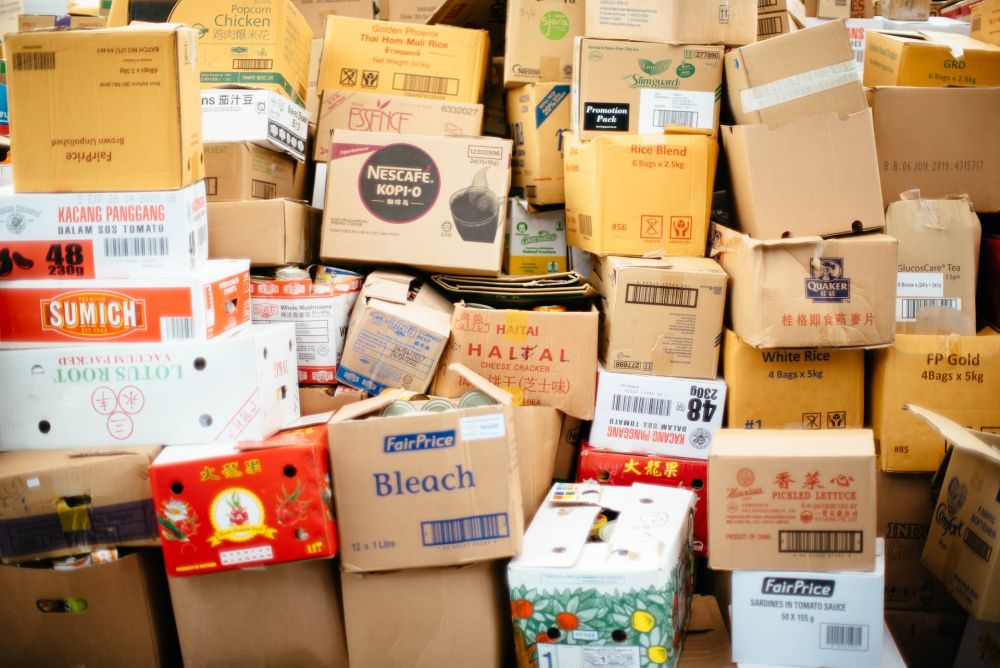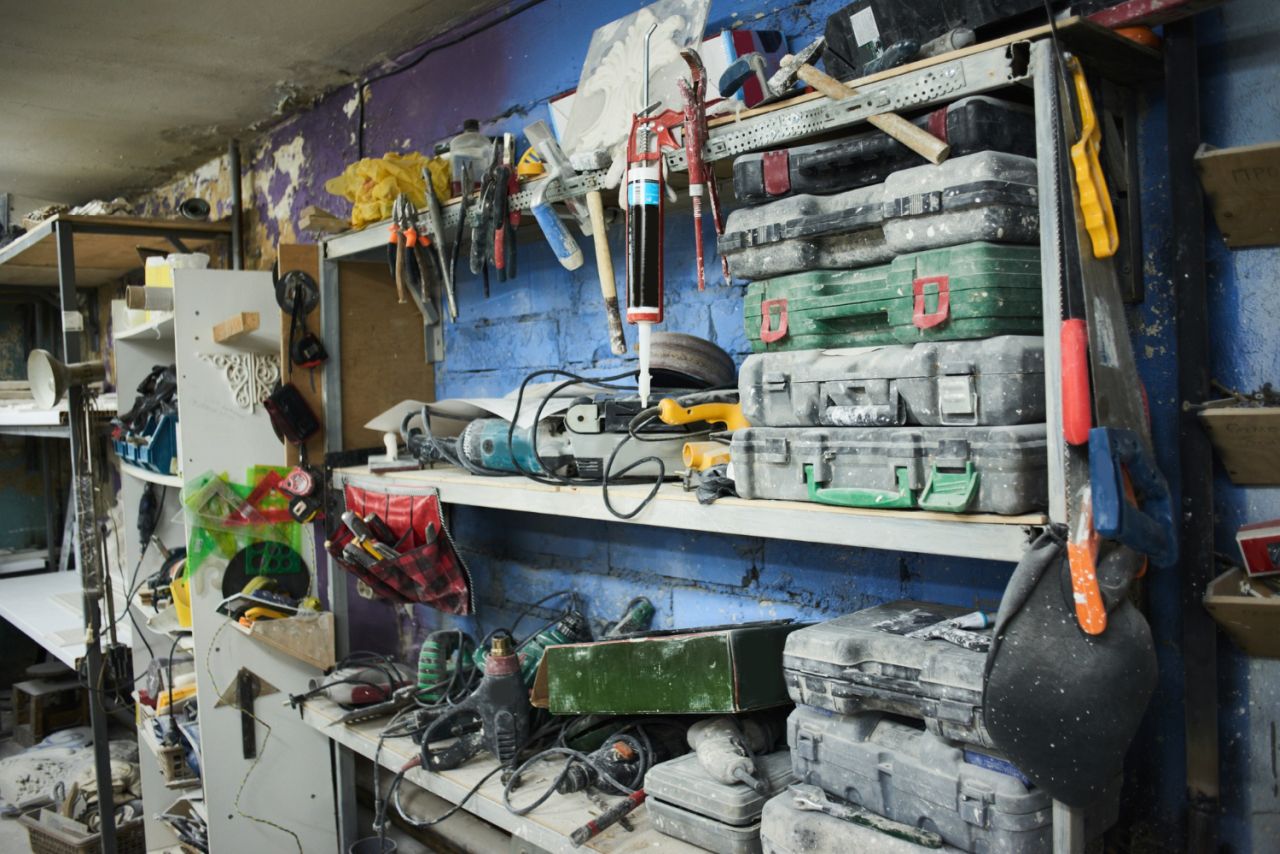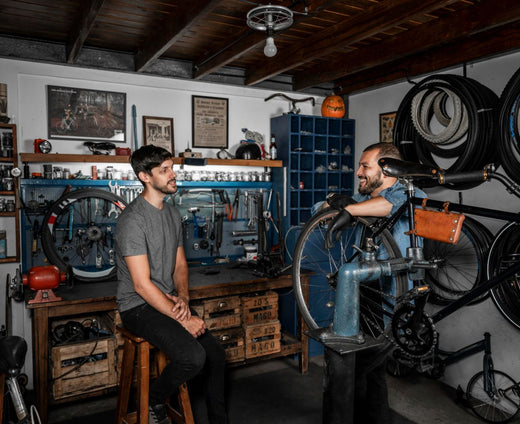So you're thinking of renting a self-storage unit to store your stuff. But you need to figure out how they work.
Or maybe this is the first time you've used one, and you have questions about what to expect.
Don't worry, we'll explain the basics of self-storage units in this post. Plus, we'll give you tips on getting the most out of your storage experience. Let's get started! With GarageSmart® Storage Solutions, you can have the perfect garage for your needs without all the hassle.
Self-Storage Units Are Defined As:
A self-storage facility is a building where people or businesses can keep their personal or business possessions.
Storage facilities are often secured with padlocks, and tenants are provided with individual keys.
Depending on the storage facility, you can rent a unit every month or pay a lesser upfront price.

Typically, the storage lockers will be arranged in rows that radiate away from the main building.
Most of the time, the storage facility will rent the first half of each row, regardless of whether or not they need it.
Self-storage units are an excellent option when you need somewhere to put belongings that have outgrown your home.
Storage Facility Lease Procedures
Pick a Self-Storage Unit That Works for You
When it comes to functionality, self-storage facilities are essentially interchangeable.
You rent a storage unit for a set period after signing a lease.
However, the requirements of one storage facility may still need to be met by another. Some businesses provide more stringent safety procedures than others.
Discover what safety measures a storage facility must have in place.
If any of these features are missing, or if you have a bad feeling about the place, look elsewhere.
Find Out How Big a Storage Unit You'll Need
Customers commonly make the grave error of renting a storage unit that is too small for their needs.
Of course, you will lose money if you hire a storage unit that is too large.
But if you go for a too-cramped room, you'll have extra work on your hands.
If you need help visualising space, this estimator can assist.
You Can Lease a Storage Space either on the Web or in Person
Consider whether you'd prefer to rent a place via the Internet or in person. Time might be saved by renting online.
If this is your first time renting, you should stop by the storage facility beforehand and look around.
You can find out the company's policies by calling ahead or looking them up on their website.
Advice for Renting Property Online
- You can still complete a rental if the storage facility is open. This function comes in handy when you're ready to rent late at night or on the weekend.
- When you arrive at your storage facility, everything will be set up and ready to use. However, if you sign a lease, your rental period begins that day. If you want to avoid paying for extra days on the lease, you should only sign the contract a day or two before you plan to move in.
Leasing From a Real Person
Find out what you should bring to a face-to-face meeting. Some businesses allow walk-in leasing, while others insist on an appointment.
Unfortunately, a helpful leasing representative is only sometimes readily available at self-storage facilities.
If you are unsure, it is best to contact ahead.
A few things to remember while renting locally: you can book a spot online if you wish to rent it for some time in the future and have it guaranteed.
You must visit the physical facility of Life Storage to sign the lease agreement.
Finalise Your Lease Agreement
The rental agreement is the backbone of the self-storage system.
The lease's provisions will be spelt out in the rental agreement, and the tone and parameters for your stay will be established here.
Before you put your signature on anything, make sure you read the fine print.
This contract may be signed either in person or electronically.
Technically, we cannot provide you with legal counsel regarding your lease.
A storage manager would be able to clarify the jargon for you. However, we advise you to consult a lawyer if you have doubts about the contract.
Here's an overview of a typical rental agreement:
- The Unit's Description
- Duration of the Lease
- Storage tenant obligations (such as not occupying the unit as a primary residence).
- Conditions for Refunding
- Financial obligations that cannot be met
- It would help if you get renters' insurance, a pro says.
- Rental insurance is typically mandatory at storage facilities as well. Both the landlord and the tenant benefit from this rule is in place.
Create an Initial Down Payment
Your first month's rent is due when you sign the lease. Online monthly payments will be available in the future.
Some businesses also accept in-person and automated payments.
It would help if you stayed on top of your monthly payments to avoid late fees. Your storage unit may be repossessed if you are more than two months behind on payments.
Get In and Settle Into Your New Space
Whether you rent the apartment online or in person will determine how you gain entry. When you rent a unit in person, the manager will show you where it is and check that you have the right lock.
Why You Should Get a Self-Storage Unit
The need for self-storage can stem from various issues, not just an abundance of unnecessary possessions.
Numerous everyday occurrences call for either temporary or permanent storing solutions.
Some of the most typical causes of self-storage leases are:
- Seasonal storage - To make room for year-round belongings, many individuals put away lawn tools, winter clothes, RVs, Christmas decorations, and other items only used occasionally.
- Renovations can take a long time and leave a mess around the house for weeks. You may keep everything neat and safe in storage until you finish the project.
- College students who don't want to schlep their possessions from their dorm rooms home for the summer will commonly use a storage facility close to campus.
- Relocating - When packing up and moving requires a lot of time and effort, many people store their belongings in a self-storage unit.
- Service members can store their things securely during military deployment. The same holds for the military community, whose families frequently relocate.
- RV, boat, car, motorbike, and other motorised vehicle storage - U-Haul storage facilities are prepared to store a wide variety of motorised vehicles in addition to furniture and boxes.
Is There Anything I Can't Keep In My Storage Unit?
Self-storage facilities are designed with safety and security in mind.
Every self-storage facility has extra safeguards to ensure the safety of your belongings.
Indoor storage facilities are the safest bet if you need to store items with high monetary or sentimental value, as only authorised staff are granted access to the premises.
A storage container is perfect for storing seasonal clothing, shoes, and other items you cannot wear. Need a place to store your books or papers but need more room?
A storage container can be the ideal place to keep safe and secure items like books, artifacts, crafts, and paintings.
Make sure to take good care of any tools or equipment in your storage unit. Have any spare furniture, hefty winter coats, or clear skies? It's possible to store anything in a warehouse.
What Should You Not Store in Your Unit?
All your furniture, clothing, books, and other home items (with a few exclusions) can be stored in a self-storage container.
However, it would help if you didn't store anything prohibited by the storage facility's guidelines. To assist you, we have compiled a list of goods you should never keep in a storage unit.
- Weapons
- Substances that are against the law
- Drugs
- Commodities that spoil quickly
- Food\s and Plants
- Theft of Property
- Pets
Looking for a storage solution for your garage? Look no further than GarageSmart®! We offer a variety of garage storage solutions to fit your needs. Call us today to learn more!
Conclusion
When you have too much stuff to fit in your house, a self-storage facility is a great solution. When consumers or companies need a safe place to keep their belongings, they often turn to a self-storage facility.
You can either pay a monthly fee or a lower, one-time fee to the storage facility for the use of a unit.
There are rental agencies that welcome walk-ins and others that need scheduling ahead of time.
To reserve a parking space at a specific location for a specific time in the future, you can do it online.
Whether you book your unit remotely or in person, the self-storage facility manager will show you where it is and make sure you have the correct lock. If you fall more than two months behind on your storage unit payments, the facility has the right to repossess the unit.

There are certain companies that will even take payments over the phone or via a machine.
The security and protection of your belongings are paramount in the planning of a self-storage facility. Indoor storage units are the best option for storing valuables, whether they are monetary in nature or sentimental in nature.
Put away your out-of-season wardrobe, footwear, and other goods in a storage locker.
You should follow the storage facility's rules and regulations to avoid fines and penalties.
Content Summary
- So you're considering getting a self-storage facility to put your items in.
- Yet you must discover their functioning in order to use them.
- The purpose of this article is to provide a foundational understanding of self-storage facilities.
- Storage lockers are defined as: When consumers or companies need a safe place to keep their belongings, they often turn to a self-storage facility.
- You can either pay a monthly fee or a lower, one-time fee to the storage facility for the use of a unit.
- When you have too much stuff to fit in your house, a self-storage facility is a great solution.
- Practically speaking, self-storage units serve the same purposes.
- You sign a lease and pay monthly or annual fees to use the storage facility.
- Find out what checks and balances are expected of a storage facility.
- If you don't find any of these things, or if you just get a terrible vibe from the house, you should probably keep looking.
- Renters frequently make the fatal mistake of reserving a storage space that is inadequate for their requirements.
- It seems to reason that if you rent a storage unit that is too big, you will end up spending more money than necessary.
- If you choose a space that is too small, though, you will have more cleaning to do.
- A self-storage unit can be rented in person or online.
- You should think about whether you'd rather rent a house online or in person.
- Renting online could be more convenient.
- To get a feel for the place, especially if this is your first storage rental, you should visit the facility in advance.
- Tips for Finding a Rental Property On the Internet If the self-storage facility is accessible, you can still sign a lease.
- You can expect to find your storage unit fully operational upon arrival.
- A rental period starts the day a lease is signed.
- Only sign the lease a day or two before you plan to move in to prevent being charged for days you don't occupy the space.
- Learn what materials are required for a personal encounter.
- Unfortunately, self-storage facilities don't always have someone available to help you with the leasing process.
- Some considerations to keep in mind when renting on the local level: If you'd like to reserve a space for a future date, you can do so here on the website.
- The lease agreement for Life Storage can only be signed in person, at the storage facility.
- We are unable to give you legal advice about your lease because of ethical and legal constraints.
- In this case, a storage manager would be the best person to ask for definitions.
- Still, if you have questions regarding the contract, you should probably talk to a lawyer.
- A seasoned expert advises that you invest in renters insurance.
- Additionally, most storage facilities require tenants to have rental insurance.
- This guideline is advantageous for both the landlord and the tenant.
- Make a primary down payment.
- When you sign the lease, you must also pay the first month's rent in full.
- Future developments include enabling monthly payments to be made online.
- Staying on top of your monthly payments will help you avoid late fines.
- If you fall more than two months behind on your storage unit payments, the facility has the right to repossess the unit.
- The admission procedure will depend on whether the unit is rented online or in person.
- The manager will show you the apartment and make sure you have the correct lock when you rent it in person.
- Different problems, not just an excess of useless stuff, can necessitate the use of a self-storage unit.
- Self-storage leases are commonly signed for the following reasons:
- Space reserved for seasonal storage - Many people store their lawnmowers, winter coats, recreational vehicles, and holiday decorations during the warmer months so they have place for their year-round possessions.
- You can put everything away in storage until you're ready to use it.
- A lot of individuals choose self-storage units because packing and moving takes so much time and energy.
- During military service, service members have a safe place to keep their personal belongings.
- Not only can you store your furniture and boxes at a U-Haul facility, but also a large selection of cars and trucks.
- The security and protection of your belongings are paramount in the planning of a self-storage facility.
- All of the extra precautions that a storage facility takes to protect your property are standard.
- Put away your out-of-season wardrobe, footwear, and other goods in a storage locker.
- Do you need more space to store your books or papers?
- Books, relics, crafts, and paintings are just some of the things that can be kept safely and securely in a storage container.
- The tools and equipment you keep in a storage container deserve your careful attention.
- Just about anything can be stashed away in a warehouse.
- A self-storage container can hold almost everything you own, including your furniture, clothing, books, and other household things.
- You should follow the storage facility's rules and regulations to avoid fines and penalties.
FAQs About Self Storage
Can You Go In and Out of a Storage Unit?
You can pop in and out of your storage unit as often as you like during our opening hours to add things or take the stuff away. It's a totally secure storage space, and you can stay as long as you like or for as little as one week.
Will Clothes Get Ruined in a Storage Unit?
If they catch a whiff of anything they like, your clothes are toast! Long-term or short-term, you must wash your clothes before storing them in a storage unit. Also, while we're on the subject, make sure your clothes are 100% dry before storage. If they aren't, the moisture in them can create mould and mildew.
Will Pictures Get Ruined in Storage?
High heat, humidity and dust can do a number on photos, which is why having a climate-controlled storage unit is so important. Crafts that require adhesives will be in need of climate-controlled storage as well. We recommend storing your photos at 65-85 degrees Fahrenheit or below to ensure they avoid any damage.
What Do You Put on the Floor of a Storage Unit?
The floors in our storage units are concrete; therefore, they can get some condensation, especially during extreme changes in temperature and humidity. We recommend putting something on the floor, such as plastic, a tarp, or wood pallets. Even a plastic spray can be used for lighter-boxed items.
Why Is Self Storage Important?
They offer storers a safe, secure and well-managed space to store valuables, with 24/7 access and on-site box stores helping with your every need.





